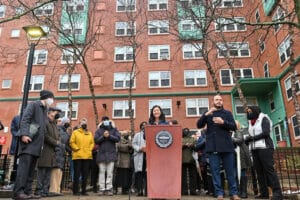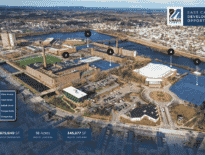
Boston Mayor Michelle Wu (center, at podium) and other officials announce a $50 million infusion into capital improvements at the Boston Housing Authority's Mildred C. Haley Apartments property on Jan. 20, 2022. Photo by Jeremiah Robinson | Boston Mayor's Office
Boston Mayor Michelle Wu followed in her two predecessors’ footsteps by proposing a transfer tax on expensive homes and many commercial properties to raise more money for affordable housing.
Wu’s proposal, which would put a 2 percent tax on all Boston real estate sales worth $2 million and more, mirrors one pushed by former Mayor Marty Walsh in 2019. The plan would have generated $99.7 million for the city’s Neighborhood Housing Trust fund in 2021 based on city real estate sales for that year, Wu’s office said. The fund makes grants for the construction and preservation of affordable housing units.
Former Mayor Kim Janey, Wu’s immediate predecessor, also proposed a transfer tax for the same ends during her short tenure. Her proposal levied the same tax rate on sales of $3 million and above.
Both prior proposals, which required the state legislature’s sign-off, have met with silence on Beacon Hill. Wu’s office said she filed a home rule petition with the City Council yesterday, which must pass it before the measure is sent over to state legislators.
“Housing is health, safety, and opportunity – and housing stability must be the foundation for our recovery from the pandemic. As the cost of housing has become more and more out of reach for families, we must take urgent action to keep families in their homes and build a city for everyone,” Wu said in a statement. “I’m grateful for all the advocates and colleagues who have championed this proposal over many years and partners who have helped inform this updated version.”
Wu’s plan includes carve-outs exempting certain sales from the tax, including sales between family members, and allows the city to add other exemptions protecting “economically vulnerable populations, affordable housing developments, deed-restricted housing, owner occupant homeowners, beneficiaries of a city-approved homebuyer program” and others in the future.
Wu’s proposal comes a week after the Mass General Brigham hospital system announced it was throwing its support behind a bill already on Beacon Hill that would allow any town or city to put its own transfer tax in place to fund affordable housing.
During the 2019 debate over the transfer tax proposal, Both commercial real estate industry group NAIOP-MA and the Greater Boston Association of Realtors said they fear the tax could both discourage new construction and cause developers or buyers of buildings to pass on the cost of the tax on to their tenants.




 |
| 

